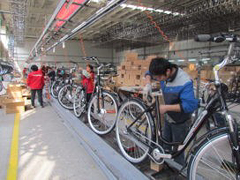EU’s Document on E-Bike Dumping Accuses China of State Interference and Distorting Competition
21/11/2018 12:00

BRUSSELS, Belgium – The last Thursday published “General Final Disclosure Document” on “Case AD643 – Anti-dumping proceeding concerning imports of electric bicycles originating in the People’s Republic of China” brings to light the motivations that lead to the European Union’s intention to impose high dumping duties on e-bikes imported from China. The European Commission’s motivations vary from state interference by China leading to distorting competition bringing significantly lower than average prices of imports which led to findings of substantial undercutting and dumping.
What the 32 paged Disclosure Document (available for download on this page) also reveals are the very detailed counter arguments brought forward in this case by the CCCME (China Chamber of Commerce for Import and Export of Machinery and Electronic Products); the Collective of European Importers of Electric Bicycles as well as individual companies like Giant China. Giant China in particular pushed for Market Economy Treatment (MET) in this case which was rejected by the European Commission.
Aluminium market, land use rights and preferential tax rates
The rejection of Giant China’s Market Economy Treatment by the European Commission and the reasoning behind it, brings to light China’s State interference in various areas. The Disclosure Document says to have found “Significant State interference in relation to the aluminium market” which resulted in significant distortion. The European Commission’s investigation also brought about that “Giant effectively did not pay for its land use rights.” And that “The preferential tax rate was a financial incentive of a quasi-permanent open-ended character which could also serve the purpose of attracting capital at discounted rates, thereby significantly distorting competition over a long period of time. The Commission also concluded that the tax deduction for R&D expenses was recurrent and not limited in time and therefore would have similar effect.”
‘Situation of material injury’
The European Commission also concludes in its General Final Disclosure Document on Case AD643 that “The average prices of imports from the PRC have been constantly and significantly below the average prices from any other source of supply (…) which led to findings of substantial undercutting and dumping.”
The Document further says “Whilst the investigation established the existence of a significant volume of imports at dumped and undercutting prices, it also established the strength in demand in the electric bicycle market which somewhat limited the negative effects on the profit margin of the Union Industry. (…) Nevertheless, the Commission observed that the profit margin of the Union industry declined in all years but one and was overall at depressed levels. Furthermore, the conclusion of material injury is not based on a single indicator. Other indicators, of which some of financial nature such as cash flow, were analysed together with the evolution of the profit margin to conclude to a situation of material injury.”
Countervailing duty
The European Commission’s document end with this assumption “In view of the conclusions reached with regard to dumping, injury, causation and Union interest, definitive anti-dumping measures should be imposed in order to prevent further injury being caused to the Union industry by the dumped imports of the product concerned. It is noted that an anti-subsidy investigation was carried out in parallel with the antidumping investigation. In view of the use of the lesser duty rule and the fact that the definitive subsidy rates are lower than the injury elimination level, it is appropriate to impose a definitive countervailing duty at the level of the established definitive subsidy rates and then impose a definitive anti-dumping duty up to the relevant injury elimination level.”
Duties of between 18.8 and 79.3 percent
This means that European Commission is proposing definitive or final duties of between 18.8 and 79.3 percent.
The definitive duties on e-bikes imported from China need to be approved by EU countries and would need to be in place by January 18, 2019. They apply for five years. Interested parties have until November 26 to comment on the Commission’s plans.
What the 32 paged Disclosure Document (available for download on this page) also reveals are the very detailed counter arguments brought forward in this case by the CCCME (China Chamber of Commerce for Import and Export of Machinery and Electronic Products); the Collective of European Importers of Electric Bicycles as well as individual companies like Giant China. Giant China in particular pushed for Market Economy Treatment (MET) in this case which was rejected by the European Commission.
Aluminium market, land use rights and preferential tax rates
The rejection of Giant China’s Market Economy Treatment by the European Commission and the reasoning behind it, brings to light China’s State interference in various areas. The Disclosure Document says to have found “Significant State interference in relation to the aluminium market” which resulted in significant distortion. The European Commission’s investigation also brought about that “Giant effectively did not pay for its land use rights.” And that “The preferential tax rate was a financial incentive of a quasi-permanent open-ended character which could also serve the purpose of attracting capital at discounted rates, thereby significantly distorting competition over a long period of time. The Commission also concluded that the tax deduction for R&D expenses was recurrent and not limited in time and therefore would have similar effect.”
‘Situation of material injury’
The European Commission also concludes in its General Final Disclosure Document on Case AD643 that “The average prices of imports from the PRC have been constantly and significantly below the average prices from any other source of supply (…) which led to findings of substantial undercutting and dumping.”
The Document further says “Whilst the investigation established the existence of a significant volume of imports at dumped and undercutting prices, it also established the strength in demand in the electric bicycle market which somewhat limited the negative effects on the profit margin of the Union Industry. (…) Nevertheless, the Commission observed that the profit margin of the Union industry declined in all years but one and was overall at depressed levels. Furthermore, the conclusion of material injury is not based on a single indicator. Other indicators, of which some of financial nature such as cash flow, were analysed together with the evolution of the profit margin to conclude to a situation of material injury.”
Countervailing duty
The European Commission’s document end with this assumption “In view of the conclusions reached with regard to dumping, injury, causation and Union interest, definitive anti-dumping measures should be imposed in order to prevent further injury being caused to the Union industry by the dumped imports of the product concerned. It is noted that an anti-subsidy investigation was carried out in parallel with the antidumping investigation. In view of the use of the lesser duty rule and the fact that the definitive subsidy rates are lower than the injury elimination level, it is appropriate to impose a definitive countervailing duty at the level of the established definitive subsidy rates and then impose a definitive anti-dumping duty up to the relevant injury elimination level.”
Duties of between 18.8 and 79.3 percent
This means that European Commission is proposing definitive or final duties of between 18.8 and 79.3 percent.
The definitive duties on e-bikes imported from China need to be approved by EU countries and would need to be in place by January 18, 2019. They apply for five years. Interested parties have until November 26 to comment on the Commission’s plans.
November 21, 2018
Source: Bike EU
Source: Bike EU
Các tin khác
- More efforts needed to maintain export growth to China: Insiders (24/04/2024)
- Shadow trade minister calls for greater focus on removal of Chinese trade barriers (24/04/2024)
- New U.S. Solar Panel Tariff Intensifies Sino-American Green Tech War (24/04/2024)
- It is expected that there are higher orders and revenue in the second quarter from European businesses (24/04/2024)
- U.S. Ceramic Manufacturers Seeking Tariffs Against Indian Import (24/04/2024)
 Home
Home
 About Us
About Us




















